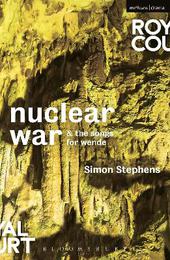
|
Nuclear War & The Songs for Wende
Paperback / softback
Main Details
| Title |
Nuclear War & The Songs for Wende
|
| Authors and Contributors |
By (author) Simon Stephens
|
| Series | Modern Plays |
|---|
| Physical Properties |
| Format:Paperback / softback | | Pages:72 | | Dimensions(mm): Height 198,Width 129 |
|
| Category/Genre | Plays, playscripts |
|---|
| ISBN/Barcode |
9781350050877
|
| Classifications | Dewey:822.92 |
|---|
| Audience | | Professional & Vocational | |
|---|
|
Publishing Details |
| Publisher |
Bloomsbury Publishing PLC
|
| Imprint |
Methuen Drama
|
| Publication Date |
19 April 2017 |
| Publication Country |
United Kingdom
|
Description
I want, one more time, to be absolutely in the moment . . . I am going to try as hard as I can to not be a human being. A series of suggestions on desire, death and time. Nuclear War is the searing result of a groundbreaking and form-defying collaboration between Simon Stephens and the choreographer and movement director Imogen Knight, developed by Actors Touring Company. Introduced by the author, this edition also features a suite of lyrics written by Simon Stephens for a musical collaboration with Dutch singer-songwriter Wende Snijders, performed at Schouwburg Het Park in Westerdijk, The Netherlands, in March 2017. Nuclear War was published to coincide with the world premiere of the play at the Royal Court Theatre, Upstairs, London, in April 2017.
Author Biography
Olivier Award winner Simon Stephens is one of Britain's best-loved playwrights. The author of more than twenty stage plays, including Punk Rock, Port, Three Kingdoms and Pornography, as well as the celebrated adaptation of The Curious Incident of the Dog in the Night-Time, he is a former tutor on the Royal Court Young Writers Programme. Awards include the Pearson Award for Best New Play, 2001, for Port; Olivier Award for Best New Play for On the Shore of the Wide World, 2005; Best Foreign Playwright, as voted by German critics in Theater Heute's annual poll, 2007; the Critics' Awards for Theatre in Scotland for Best New Play, 2008 for Pornography; and the Olivier Award for Best New Play, 2013, for The Curious Incident of the Dog in the Night-Time. His adaptation of Curious Incident of the Dog in the Night-Time won the 2015 Tony Award for Best Play.
ReviewsSimon Stephens is clearly trying something new. Instead of a play with fixed characters, he offers a text he describes as "fluid and contradictory and tentative and inchoate" that offers maximum freedom to the director, Imogen Knight, and the five performers ... a woman traumatised by personal loss and desperately seeking human contact as she journeys through a city [ ... ] travels on buses and tubes, sits in coffee bars, marvels at the beauty of the women she sees - "They come from all over the world to be be here" - but all the time she is shadowed by the memory of a lost lover and by her own inviolable solitude. -- Michael Billington * Guardian * By pushing past language, Nuclear War resists definite interpretation. It's felt before it's fully understood: a swirl of sensations and associations, impressions that race off before you've quite grasped them. Images stick in your mind's eye: figures gorging on tangerines, bricks piling up in somebody's arms. Meaning melts and multiplies. At the Royal Court, where writing rules supreme, that's radical. -- Matt Trueman * Whatsonstage * Our theatre gains from being sporadically hosed down by decontaminating jets of lyricism. I thought of TS Eliot at the sight of the Fury-like quartet of anonymous figures (here two male, two female) who stalk and taunt this fear-filled woman with impassive faces (obscured at points by gas-masks and stockings) and eerie synchronised motions (zombie-lurchy, spasmodic-twitchy, sexually-thrusty). "I can't bear this any more," she says. "You have to bear this," they chorus -- Dominic Cavendish * Telegraph * The prolific Stephens, who has had major mainstream success with his adaptation of The Curious Incident of the Dog In The Night-Time, is saluted for the relish with [which] he spans an English and a European sensibility in plays such as Three Kingdoms ... What follows is a physicalised poem of urban alienation. -- Paul Taylor * Independent * The modern city is like a jungle, but it's also a dislocated, fragmented, cruelly capitalist place. Nuclear War isn't about nuclear war, but it does offer a sickly vision of an atomised, alienated society, a more visceral version of what Stephens was also exploring in Carmen Disruption. Staggering around the city, the woman desperately seeks connection, affection and sexual fulfilment. But the ending, as she returns to her house alone, perhaps suggests that she has to reconnect with herself first - and it is through saying goodbye and letting go of the lost loved one that she is also finally released. -- Holly Williams * Exeunt *
|